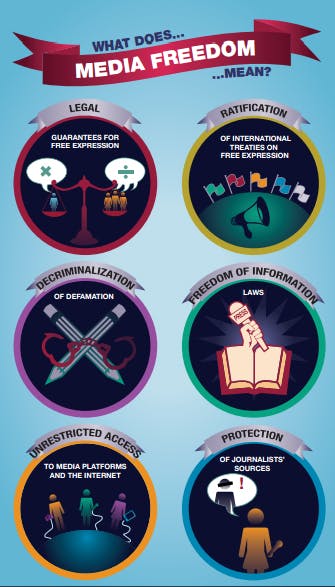A new UNESCO report, “World Trends in Freedom of Expression and Media Development,” examines press freedom throughout the world. The report was launched at an event hosted by the United Nations Foundation and Freedom House at the U.S. House of Representatives, symbolizing the U.S. commitment to press freedom.
While UNESCO has long espoused freedom of expression as an international norm and press freedom as a vital element in building open, transparent, and inclusive societies, the UN’s education, science, and culture agency has expanded its work in promoting freedom of expression and the protection of journalists over the last three decades. In fact, it is the only UN agency with this mandate.

As the report shows, we are in a period of unprecedented change for new media and citizen journalism. Yet more information does not necessarily ensure more freedom of expression. Indeed, this report illustrates that governments in developed and developing countries are reining in free expression.
This global assessment offered an opportunity for an expert panel – moderated by Eugene Robinson of the Washington Post, a Pulitzer Prize winning journalist – to highlight their concerns with key trends:
-
- Freedom of journalists has recently been compromised due to concerns about terrorism and technology that permits collection of personal communications.
-
- Protection of journalistic sources is also under threat in many countries with a tradition of press freedom due to the same technology.
-
- Pluralism and independence in media as a matter of economic ownership and control is actually being reduced throughout the world as media conglomerates expand.
-
- The financial crisis limited resources of traditional TV, radio, and print media, and owners made hard choices about what should be covered. This shift, combined with internet and social media sources, has increased the fragmentation of information.
-
- Women journalists still face discrimination. As a result, issues of particular concern to women are not as well-covered and reporting diversity is diminished.
-
- Training, especially for women and minority journalists, is essential to provide information and insights into societies that are changing or in conflict. Communication about what is going on and why is vital to improving social stability.
-
- 71 journalists were killed in 2013; to date, 22 journalists have been killed in 2014. Journalism is a dangerous job – and areas of political unrest, ethnic violence, and war where an independent view is essential are often the least covered.
UNESCO’s commitment to tracking and reporting on these trends is not only critical to expanding press freedom, but also provides insights on what is going on within various world regions. Several panelists stressed freedom of expression is essential to the creation of democratic societies and strong governance.
The panelists also shared their observations from UNESCO meetings and noted the ramifications of the U.S. decision three years to cut off all funding to the organization. They said that over the past few years the U.S. has often made brilliant interventions in support of freedom of expression, protecting natural heritage and access to education. Despite powerful rhetoric, however, the U.S. was ignored and chastised for its nonpayment of dues, severely eroding U.S. influence.
As the UN negotiates a new development framework to replace the Millennium Development Goals, it is essential to embed freedom of expression within a “good governance” goal. Yet, this concept has been deleted from the recent “Zero Draft.” Much work remains to secure the promise of a world where free expression is the norm and journalism valued as a true social asset.



 View All Blog Posts
View All Blog Posts